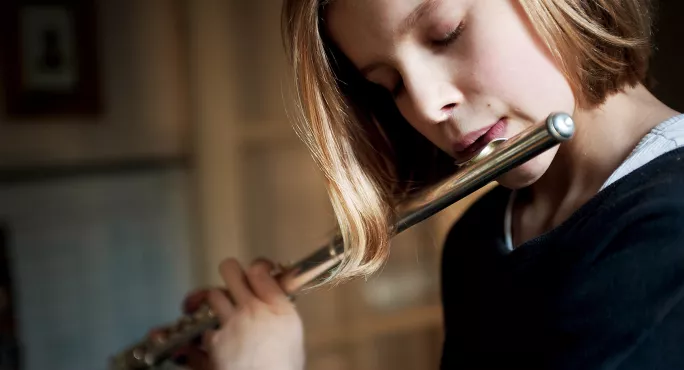
‘Huge boost’ in numbers having music lessons

Research tracking instrumental music instruction in Scotland has found that pupil numbers have rebounded “very strongly” after participation took a hit during the Covid pandemic.
It finds that the number of pupils benefiting from lessons last year was at the highest level since the Instrumental Music Services Survey 2023 began in 2013.
The survey - run by the local government body the Improvement Service - has found that in 2022-23, 61,715 pupils participated in instrumental music lessons - up 7 per cent on the previous year and 48 per cent on the low point of 2020-21.
The proportion of the pupil roll participating in instrumental music instruction, meanwhile, hit 8.9 per cent in 2022-23, the highest since 2017.
The research credits the Scottish government’s decision in 2021 to abolish tuition of fees for increasing “interest in and demand for the service”.
However, the researchers note that because government funding for the policy is to remain the same - at £12 million per year - at a time when costs have “risen significantly”, this represents “a real-terms cut”.
‘Very positive’ numbers
In a blog Nick Cassidy, research manager at the Improvement Service, describes the 2022-23 survey findings as “very positive”. He said there had been “a huge boost to the number and proportion of pupils taking part in instrumental music lessons, particularly since the pandemic years”.
But he adds that because government funding was not keeping pace with inflation, more of the costs for music lessons in the future would “have to come either from charitable donations, cost savings or from already squeezed local authority budgets”.
He concludes: “It remains to be seen whether future funding and capacity is able to match the desire of pupils to take part.”
- Background: Instrumental music tuition fees to be scrapped
- Related: Free music tuition continues in Scotland, but demand not met
- Long read: Scrapping fees alone won’t keep the music playing in schools
- Analysis: Music education in Scotland ‘diverse but fragile’
The Instrumental Music Services Survey 2023 highlighted that although participation in music lessons in 2022-23 was up on previous years, the vast majority of councils remained unable to meet demand. Just five councils reported having no waiting lists.
In some areas the research found only a small number of pupils were on waiting lists last year, but in others it said “the level of demand was vastly larger than supply”.
Dumfries and Galloway Council had 787 pupils on its waiting list, North Lanarkshire Council noted that there were 144 pupils waiting, while in Angus Council this was 260. In South Ayrshire Council the number of interested pupils was three times the number participating, while Renfrewshire Council could accommodate just one third of those who were interested.
Fall in instructors
The research also highlighted that while participation has grown last year, the number of full-time-equivalent instructors had fallen 4 per cent since 2013-14, from 652 to 625.
The report highlighted that the number of instructors employed full-time “has been declining over the past 10 years of the survey”.
Last year, full-time instructor numbers were “at their lowest on record, while part-time numbers have continued to rise”.
The average number of pupils per instructor was just under 99 last year, according to the report - up 9 per cent on the previous year.
“This reflects the growing number of pupils in the service, while instructor numbers are relatively level. It may also reflect the roll-out of all-class provision in many local authorities,” the report states.
The information in the report on the extent to which services were accessed by disadvantaged pupils appears contradictory.
The research finds that just under 12 per cent of pupils taking part in instrumental music instruction were in receipt of free school meals (based on information from 17 of 32 councils).
The report suggests that pupils in receipt of free school meals were under-represented within instrumental music services, given that about 19.4 per cent of pupils in P6 and above are registered for free school meals (all pupils in P1-5 in Scotland receive free meals).
It also finds that 27 per cent of instrumental music service pupils were resident in the 20 per cent most deprived areas, compared with 19.5 per cent of the population.
This suggested “more engagement with services by pupils from more deprived backgrounds”.
However, only 14 councils were able to provide this information, and the researchers acknowledged more work was needed to ensure “a full and consistent approach in future years”.
You need a Tes subscription to read this article
Subscribe now to read this article and get other subscriber-only content:
- Unlimited access to all Tes magazine content
- Exclusive subscriber-only stories
- Award-winning email newsletters
- Unlimited access to all Tes magazine content
- Exclusive subscriber-only stories
- Award-winning email newsletters
You need a subscription to read this article
Subscribe now to read this article and get other subscriber-only content, including:
- Unlimited access to all Tes magazine content
- Exclusive subscriber-only stories
- Award-winning email newsletters
- Unlimited access to all Tes magazine content
- Exclusive subscriber-only stories
- Award-winning email newsletters



